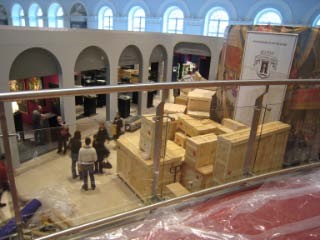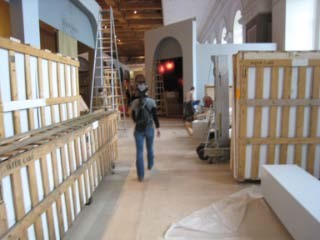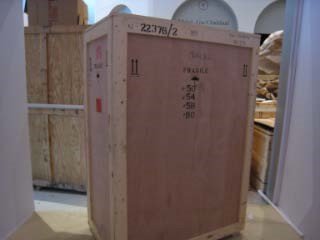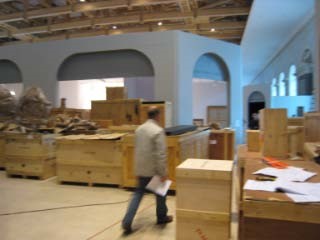Mathes Missive From Moscow #6 – Saturday: Set Up Part One
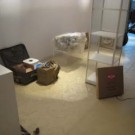
Greetings from Moscow,
It’s not surprising that normal people have no idea what an art fair is, or what the art business is about. Most people have no real idea what it means to be a dentist, or a real estate broker, or a roofer, either. Within every specialty there are all kinds of characters, all kinds of stories, all kinds of craziness. Art is a “glamour” business, however, like fashion, entertainment, music and publishing. Glamour businesses basically are those that have acquired that special aura of sexy exclusivity which allows them to get away with exploiting idealistic young people at slave wages and making a select few at the top of the pyramid rich beyond their sickest dreams. This is why the artworld often comes across as snobby and intimidating; many dealers deliberately cultivate the mystique that their lives, opinions and wares are somehow on a higher level than other people’s — if you want to buy something, buddy, you’ll have to prove to us that your money is as worthy as the more important money we usually pocket.
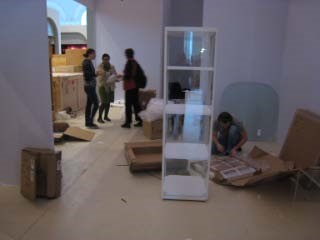 I suppose that what I’ve just said are secrets. I told you at the outset that the art world is built on secrets, and that I couldn’t reveal any. But snobbery, intimidation and exploitation are not any secrets of ours, so you can have them. We make our money the old-fashioned way. Exactly what that old-fashioned way is, of course, I cannot say (it is a secret). But you’re welcome to follow us around and glean what you can. Let’s begin on Saturday at 10:00 am., our first real day of set-up for the Moscow Art Fair. I have just enjoyed a hearty five hours of sleep, having finished the last missive at 2:30 in the morning.
I suppose that what I’ve just said are secrets. I told you at the outset that the art world is built on secrets, and that I couldn’t reveal any. But snobbery, intimidation and exploitation are not any secrets of ours, so you can have them. We make our money the old-fashioned way. Exactly what that old-fashioned way is, of course, I cannot say (it is a secret). But you’re welcome to follow us around and glean what you can. Let’s begin on Saturday at 10:00 am., our first real day of set-up for the Moscow Art Fair. I have just enjoyed a hearty five hours of sleep, having finished the last missive at 2:30 in the morning.
Marat picks us up at 10:00 am and drops us at the Manege. We meet Natalia, the Russian customs agent. She has a list of the items that we have declared are in the boxes we have shipped to Russia and which are now being opened. As each box is opened, Natalia compares the name of the item on the label (each label is printed with all the information and a small picture) with the name and picture on her list –Julia translates. Jane, holding our copy of the same list, checks off that item as having arrived (usually our registrar or other employee does this, but here in Moscow there is nobody but Jane and me). The two different shippers that we have used to get the artwork from New York to Geneva, and from Geneva to Moscow have lists of their own. Actually everybody’s list is a little different depending upon their own specific needs. It took our idealistic young staff working at slave wages several weeks to create all this paperwork (actually they’re well paid for the art business – they would just be making a hell of a lot more if they had listened to their mothers and gone to law school).
As the shippers open each crate, remove the cardboard boxes within and then unwrap each scrupulously wrapped item with each box (hey, this stuff has to make it in one piece across several thousand miles) Jane, Natalia and Julia get on with their work. Since this will take four hours, let’s take this opportunity to look at what the Manege looks like at this point.
Since the French art handlers are more expensive to hire in Russia than are white shoe lawyers in New York, our plan is to have the Russian art handlers, who are vastly cheaper, hang everything with help and direction from us. The way this usually works is for the handlers to hold up painting and tapestries in the approximate places on Jane’s plan. Jane and I then judge when the height and placement are correct. Good handlers can even help suggest alternatives if our intended placement doesn’t work. Then the handlers put in nails or screws or velcro and hang the art. When the Russians show up, however, they don’t seem to have any idea of what we want them to do. They don’t even have tools.
We have tried to anticipate any situation and have brought an abbreviated collection of tools in our luggage, just in case: staple gun, hammer, picture hooks (we simply could not carry a real toolchest as we do to other fairs). However, the Russians will not even take responsibility to use these tools, though they will be happy to move anything we want. After half an hour, we have hung one small painting and are trying to figure out the logistics of hanging something larger. Our staple gun somehow was D.O.A. We may not have enough hooks. The Russian handlers are looking very unhappy.
The following is a good lesson in why people have problems overseas — the inability to communicate, as well as cultural differences even when you can make yourself understood, can add up to disaster. Many Americans in this situation would start thinking the Russians were pretty stupid. Julia at this point explained to me that the problem was that they weren’t stupid at all. They were highly trained and very educated. Standing around, unable to contribute anything, they felt frustrated. They didn’t want to waste their time or ours, but basically there was nothing really for them to do until we were ready to have them hold up a painting to check a height level — pretty stupid work for two smart guys. These were the folks who had gotten all these hundreds of boxes into the Manege, distributed, opened, sealed, stored away. The Russian technicians had also built all the structures.
I had Julia explain that they were doing a very important job — they were like firemen. Firemen also have to around and do nothing, but when the bell rings they are available to save the day. (By the way, in case you were wondering what I do at the gallery — I am the chief fireman). One of the Russians wasn’t impressed with this argument and went off to get a replacement. He returned with a young guy from Ghana who spoke English (English apparently is the native language of Ghanians. There are many Africans working here and studying in universities. I thanked the Russian worker and said that thanks to Julia, I understood how he felt. In fact, I said, it was noble. He responded by making an unhappy face, clasping the shoulder of the Ghanian and giving him a big hug, then making a little speech in Russian and storming off.
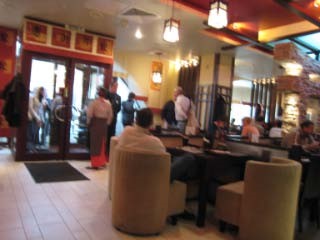 The Ghahian was very charming, but the whole idea of our hanging the show with Russian help was hopeless. These were not art handlers at all as we had been told: they were moving men and construction workers. We were going to have to hire the French handlers, whatever the cost. But it was already after three o’clock and we were faint from hunger. Time for lunch at Planet Sushi, again. It was still raining — it had been raining since our arrival — and there are no other comfortable restaurants anywhere within walking distance (Jane draws the line at eating at McDonalds or Sbarro. Sbarros are all over the place here for some reason.) Planet Sushi is staffed by young women with Asian features, dressed in kimonos, but they are not Japanese. They resemble Koreans or Mongolians more than they do Japanese or Chinese, but they are in fact from the Southern Russian republics near Afghanistan: Tajikistan, Turkmenistan and the others. Note the ubiquitous guard at the front door — even restaurants all have guards. There is also a ubiquitous cleaner — usually a woman from the same geographic area. An expert in judging bathtub rings, Jane confided to me that one is likely to end the day here significantly less spotless than one begins, so I guess these cleaners are as necessary as the guards.
The Ghahian was very charming, but the whole idea of our hanging the show with Russian help was hopeless. These were not art handlers at all as we had been told: they were moving men and construction workers. We were going to have to hire the French handlers, whatever the cost. But it was already after three o’clock and we were faint from hunger. Time for lunch at Planet Sushi, again. It was still raining — it had been raining since our arrival — and there are no other comfortable restaurants anywhere within walking distance (Jane draws the line at eating at McDonalds or Sbarro. Sbarros are all over the place here for some reason.) Planet Sushi is staffed by young women with Asian features, dressed in kimonos, but they are not Japanese. They resemble Koreans or Mongolians more than they do Japanese or Chinese, but they are in fact from the Southern Russian republics near Afghanistan: Tajikistan, Turkmenistan and the others. Note the ubiquitous guard at the front door — even restaurants all have guards. There is also a ubiquitous cleaner — usually a woman from the same geographic area. An expert in judging bathtub rings, Jane confided to me that one is likely to end the day here significantly less spotless than one begins, so I guess these cleaners are as necessary as the guards.
It was at Planet Sushi that Julia explained to me that by saying he was noble, the Russian worker thought I was making a distinction between him and the Ghanian. The Russian had given his colleague a hug to show that he was not “noble” (he had apparently thought I was making a class distinction, that he and the Ghanian were equals — and his speech was to tell me so in no uncertain terms. By noble I had meant admirable — as a writer (and a dope) I often say things in too obscure a fashion, Arlene tells me. Boy, was that ever the case here. But I’m glad it happened now to open my eyes — in just a few days we were going to have to sell complex, expensive art in a situation where the subtlest nuance of language, even language perfectly translated by Julia, could plunge us into an abyss of cultural misunderstandings. Yikes!
Meanwhile Julia herself is feeling frustrated because Jane doesn’t really want to hear her suggestions or discuss the finer points of art. On several occasions Jane gets to the pre-meltdown stage, and I have to take Julia for a walk so Jane can be alone to think about what to do with the booth. When you are very competent and very nervous you want to do everything yourself so you can be sure it will be exactly as you want it. It is part of my job to recognize such situations with Jane and clear the area so that she doesn’t have to be r ude. Jane really doesn’t like to be rude to anyone. Even morons.
ude. Jane really doesn’t like to be rude to anyone. Even morons.
After lunch we returned to the Manege. The French art handlers soon appeared with tools and smiles. Both handlers were named Christoph, so blonde Christoph is called TinTin. They were altogether the best art handlers we have ever had — worth their weight in gold (literally, I’m afraid). Together, and with occasional help from their colleagues (it took four men to hang the monumental Chagall tapestry that is the centerpiece of our booth, as well as one of the most important pieces in the entire fair). Here follows a visual diary of the day from the time the French crew took over. How we ever got the idea we could have done this ourselves with a few Russians and a few tools is mind-boggling. The French handler’s tools are pictured above left.
Scenes from the setup — note how it took four of the most competent art handlers in the world to get the Chagall tapestry up (we hang these tapestries by putting a piece of velcro on the wall — the sticky backing reinforced with staples. Each tapestry has the matching velco sewn to the back and you just pop them right onto the wall). 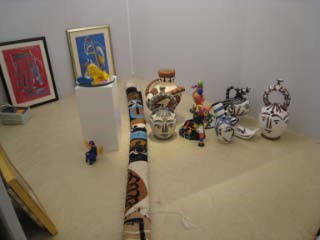
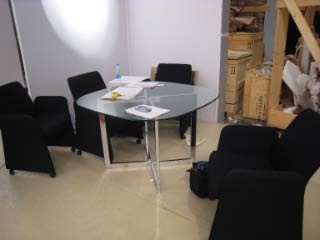
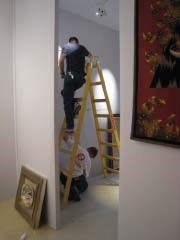
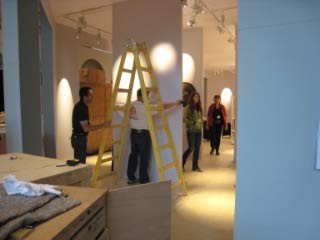
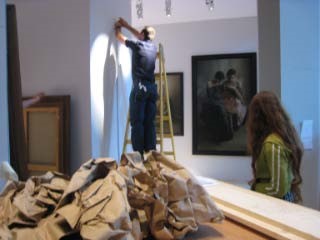
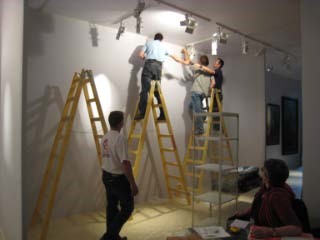
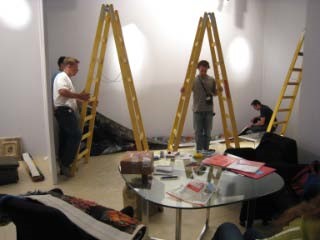
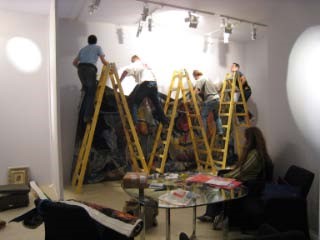
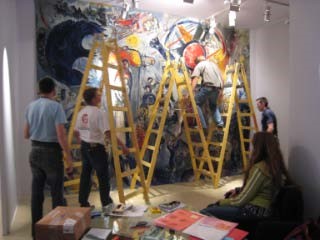
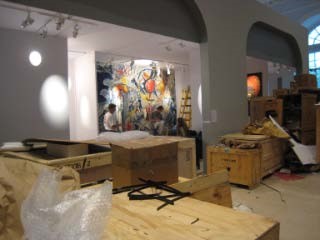
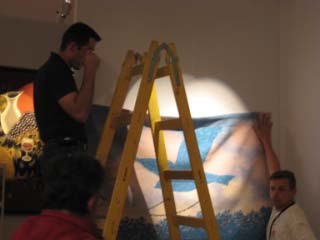
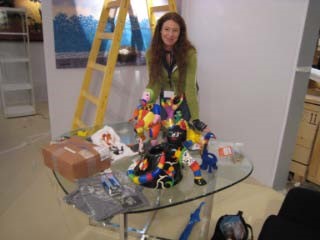
It was nearing ten pm before we finally had most of the booth hung and felt confident enough to leave for the night. Julia said that there were many restaurants from different former republics by the rail station close to the hotel. We could walk around and see what looked good.
For some reason, Jane was not ready to walk around in the pouring rain, looking for a restaurant at 10:00 pm after a twelve hour day (she’s much like Arlene in this regard). She wished us well, but she was going to Cafe Babai. I can’t say I disagreed. Julia was disappointed, although she acknowledged that the food was very good at Cafe Babai. Perhaps we could try a new restaurant tomorrow after the Gypsy Dance Concert, she said cheerfully. Julia has been mentioning the Gypsy Dance Concert for several days now, suggesting that we will find it even more interesting than the Georgia National Dance Company. Julia, of course, happens to be a Gypsy Dancer. In fact she is delivering a paper on Gypsy Dance in Greece next month and has been staying up all night working on it.
“Yes, maybe we can try a new restaurant tomorrow,” I say, humoring her. Jane smiled. After working together for so many years, Jane and I can communicate entirely by eyeball and mental telepathy. This particular smile said, “Have fun at the Gypsy Dance Concert, but I’m not going anywhere tomorrow except maybe into a bubble bath.”
Julia spoke to Marat earlier in the day and told him we would need to be picked up after seven. Luckily he is still waiting outside the Manege in the rain.
I know I said I would consolidate the two days of setup into one email, but this installment is getting pretty long, so stay tuned for Part II.
< #5 MISSIVE MISSIVE #6 Pt. 2 >


